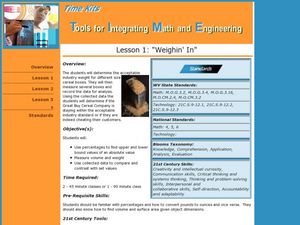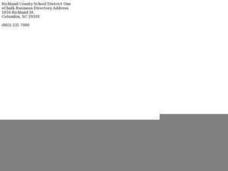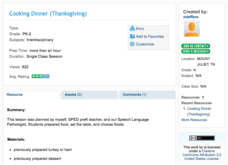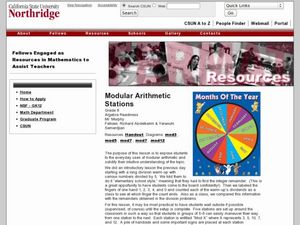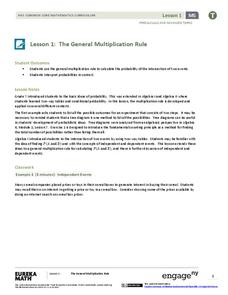Curated OER
Tools for Integrating Math and Engineering: Weighin' In
Students collect and analyze data on a fictional cereal company's products. In this measurement lesson plan, students collect data from cereal boxes (weight, volume, surface area, etc.) to determine if the boxes labels correctly inform...
Curated OER
Iron For Breakfast
Third graders are challenged to use scientific thinking, they experiment and observe which objects are attracted to a magnet. Pupils use the evidence to construct an explanation as to what common property the objects attracted to a...
Utah Education Network (UEN)
Linear Graphs Using Proportions and Rates
Using a TI-73 or other similar graphing calculator middle school math majors investigate the linear relationship of equivalent proportions. After a brief introduction by the teacher, class members participate in a timed pair share...
Curated OER
Data Analysis and Froot Loops
Use this probability and graphing lesson to have your learners work with a partner to make a necklace out of Froot Loops. They record the cereal colors randomly chosen and strung, graph their data, then use a ratio formula to determine...
American Statistical Association
Chocolicious
To understand how biased data is misleading, learners analyze survey data and graphical representations. They use that information to design their own plans to collect information on consumer thoughts about Chocolicious cereal.
Curated OER
Paul Bunyan - A Folktale Full of Math
Sixth graders solve math problems from a folktale story. In this solving math problems from a folktale story lesson, 6th graders read the Paul Bunyan folktale. Students determine today's cost of the meals that Paul Bunyan...
Kenan Fellows
Attack of the Aphids!
Insects threaten the food production industry, and aphids are one of the big players! Analyzing data of aphid populations gives insight into their behaviors. Learners model the population data of an uninhibited population with an...
Curated OER
A Rectangular Prism and Its Net
Identify the nets for prisms and other geometric shapes. Learners calculate the surface area of the rectangular prism then sketch the shapes of prisms and other polygons. Unfolded cereal boxes are used as a visual aid, great idea!
Curated OER
Cereal Box Blocks and More!
Students sort and categorize different types of boxes and cartons. In this sorting activity, students designate areas of the room to put different sizes, styles, or colors of boxes. They help their teacher count and graph the different...
Curated OER
How Much Cereal
Second graders investigate volume through the use of measuring cups. They complete a variety of measuring tasks using kitchen measuring cups. Students accurately measure the volume and compare the results.
Curated OER
The Six Faces of Garbage
Students use the mathematics of surface area to approach the problem of garbage pollution from the classroom. After watching a video, students construct replicas of cereal boxes and compute their surface area.
Curated OER
Fortified Breakfast
Students reverse engineer a cereal. In this dietary lesson students identify the minerals that the human body needs to function. Students examine how foods are fortified by food engineers. Students find the amount of iron in a cereal by...
Scholastic
Cooking Dinner (Thanksgiving)
American traditions of Thanksgiving come to life through culinary activities. Young chefs practice cooking a turkey and setting a table for a Thanksgiving family feast. They use math and reading skills to follow directions and measure...
Curated OER
Optimization For Breakfast
Students identify he proportion of a cereal box. In this algebra lesson, students define the relationship between patterns, functions and relations. They model their understanding using the cereal box.
Curated OER
Honey Bunches of Oats
Students explore a variety of crops that are used in our food products utalizing a box of the cereal, Honey "Bunches of Oates." Percentages of each of the three different kinds of flakes present are calculated.
Curated OER
Modular Arithmetic Station
Eighth graders find ways to use math everyday. In this algebra lesson, 8th graders model equation and problem solving as they multiply and divide numbers. They split up in to groups as they perform hands on operations.
Curated OER
Box It Up
Students calculate the surface area of prisms. In this geometry instructional activity, students investigate the properties of prisms and analyze ways to calculate the are of a rectangular prism. They derive the formula for surface area.
EngageNY
The General Multiplication Rule
In the first installment of a 21-part module, scholars build on previous understandings of probability to develop the multiplication rule for independent and dependent events. They use the rule to solve contextual problems.
Curated OER
Kernel Count!
Here is an impressive and thorough lesson on estimation. Young mathematicians estimate how many kernels of popcorn can fit in a tablespoon, then how many tablespoons of kernels can fit in a baby food jar. The popcorn is then popped. All...
Curated OER
Reading & Using a Nutrition Label
Students discover the importance of healthy eating. Using food nutrition labels, they read and examine the nutritional value. Students collect the data on a spreadsheet and create a graph. They analyze the media influences on product...
Curated OER
A Home for a Cricket
First graders build a habitat for crickets after studying animal survival needs. They care for and observe the crickets in the classroom habitat.
Curated OER
Objects Vibrate
Students strike a tuning fork and dip it in water. They sprinkle cereal flakes on a drum, than tap the top of the drum. Students stretch a rubber band between two fingers and pluck it; stretch the elastic farther and pluck it again. Then...
Curated OER
So Sweet
Students compare sugar levels in cereals. In this nutrition lesson, students learn how to read a nutrition facts label, predict which products will have the most sugar, discover which cereals contain the most sugar and discuss...
Curated OER
Agriculture Counts
Students discuss the kinds of things they count and how to use tally marks. In this social science lesson plan, students count animal crackers by using tally marks for each kind of animal. The tally marks are changed into numbers...


